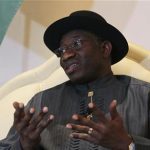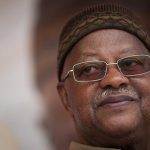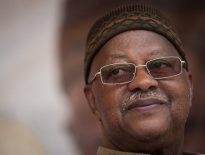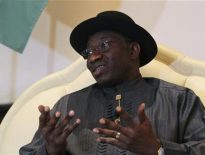* Traore says will never negotiate partition of Mali
* Pledges free elections, war on northern
rebels
* West fears emergence of “rogue state” in north
* U.N. concerned over reports of killings,
rapes
By Tiemoko Diallo and David Lewis
BAMAKO, April 12 (Reuters) – Former parliament speaker Dioncounda
Traore took over as Mali’s interim president on Thursday from the leaders of last month’s coup, promising to hold elections
and fight rebels occupying half the country.
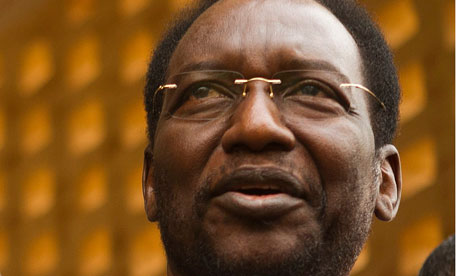
Traore, 70, a labour activist turned politician, was sworn in by Supreme Court President
Nouhoum Tapily in the capital Bamako as part of a deal to restore civilian rule after army officers staged a March 22 coup in
the West African state.
The coup shattered predominantly Muslim Mali’s image as one of the most peaceful and stable
states in the region.
Triggered by army anger over the previous civilian government’s failure to tackle a Tuareg-led
rebellion in the north, it backfired spectacularly, allowing the rebels to advance and declare a northern separatist
homeland. Al Qaeda-linked Islamist fighters are among the occupying rebels.
With residents and U.N. rights experts
reporting killings, rapes and looting on the rise in rebel-seized northern towns, there are fears of the vast northern
territory becoming a lawless and destabilising “rogue state” in West Africa.
“We will never negotiate the partition of
Mali,” Traore said at his inauguration. He promised to organise “free and transparent elections” over the whole of the
national territory.
Former President Amadou Toumani Toure, deposed by last month’s coup, resigned to facilitate the
transition deal. The military junta also released Toure’s former foreign minister and other cabinet members it had held in
custody since the coup.
“I am president of a country that loves peace,” Traore said, wearing the presidential sash
over a dark suit. But he acknowledged he was the leader of a nation “cut in two”.
He called on the rebels to pull back
from the northern towns they occupied, which include the desert trading post and seat of Islamic learning Timbuktu and the
garrison town of Gao.
“We prefer peace, but if war is the only way out, we will wage it,” Traore said. “Long live
Mali, one and indivisible!”
He said the effort to recover Mali’s territorial integrity would expel “invaders bringing
desolation and misery” which he identified as al Qaeda, drug-traffickers and hostage-takers.
“COLLAPSED
STATE”
But there were no immediate signs that Mali’s army, weakened by the putsch, was readying any
significant offensive against the rebels, whose ranks were swelled by arms and Tuareg soldiers who had served slain Libyan
leader Muammar Gaddafi.
The 15-state ECOWAS grouping of West African countries, which pressured the Bamako coup
leaders to give up power, is preparing an intervention force of up to 3,000 troops. But it has said its mandate is to prevent
further rebel advances rather than win back lost territory. Former colonial power France has offered logistical support but
not troops.
In Geneva, U.N. Secretary-General Ban Ki-moon welcomed what he called the “constitutional restoration” in
Mali and said he was discussing with West African leaders how to deal with the rebel-occupied north.
“We sincerely
hope this will be resolved as quickly as possible so that the Malian people will really enjoy their genuine feedom and
stability and also development,” he said.
The African Union also welcomed the restoration of a civilian president,
while ordinary Malians seemed relieved.
“He has to show what he is capable of,” said Bamako resident Youssouf
Ndiaye.
Traore is not expected to have enough time to organise credible elections in the 40 days alotted to him by the
constitution.
Tiebile Drame, head of PARENA, one of the Malian political parties that led opposition to the coup, said
talks between Malian political actors were expected in Burkina Faso over the weekend. It was hoped this could lead to the
naming of a prime minister over the weekend and a government next week.
But Drame saw little prospect of quick
progress on the military front against the rebels. “Everybody knows it is not possible to conduct a war in 40 days,
especially with the state of our army,” he said. “We are a collapsed state.”
CIVILIANS “KILLED, ROBBED,
RAPED”
U.N. human rights chief Navi Pillay condemned reported violations being committed against civilians after the
coup and rebel advance. She said the situation risked worsening a grave humanitarian crisis already affecting the
drought-plagued Sahel region, now awash with refugees.
“Reports from the north of the country suggest that civilians
have been killed, robbed, raped and forced to flee,” Pillay said in a statement released by her office in
Geneva.
There have been reports of Islamist rebels seeking to apply sharia, Islamic law, among the local population,
shutting down bars and ordering women to cover their heads. Other reports have spoken of looting and gun-toting,
turban-wearing fighters roaming the streets, forcing many non-Tuaregs to flee the north.
Pillay said human rights
violations, including illegal arrests, poor conditions of detention and attempts to restrict the right to freedom of
expression, have also been reported in Bamako in the wake of the military takeover.
Separatist leaders have declared a
secular Tuareg homeland of “Azawad” in an area bigger than France in northern Mali – a secession bid so far snubbed by the
world.
The separatist rebels have distanced themselves from their Islamist comrades-in-arms, who say they want to
apply sharia across all of Mali.


